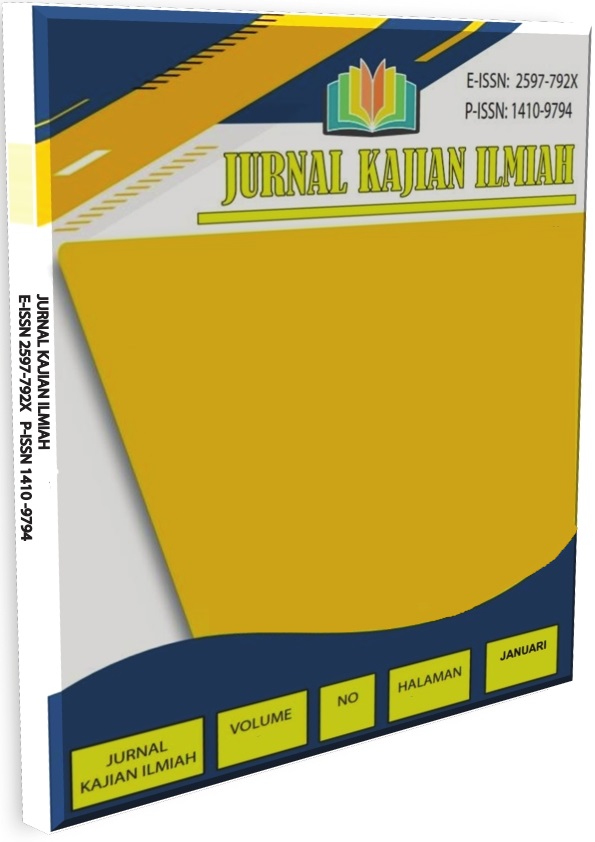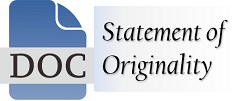Faktor Pengaruh Kepuasan Kerja Dan Loyalitas Kerja
DOI:
https://doi.org/10.31599/hvwm3v42Kata Kunci:
Job Satisfaction, LoyaltyAbstrak
A person's job satisfaction is related to the person's perspective on the experience felt when working, while loyalty is a person's desire to stay and give his best performance for the organization. Both are very important because they will be closely related to a person's work output to the organization where he works. This study reviews the factors that influence job satisfaction and loyalty to an organization. This research is in the form of a literature review, where all the discussions in it come from various printed and electronic sources from various library sources. The analyzed factors consist of Salary, Age, Distance of Residence, Training, Performance Allowance, Performance Appraisal, Career Development, and Length of Service. This article was prepared with the aim of designing a hypothesis of the influence between variables so that it can be used as a basis for studies for future research. The results of this study, namely: 1) All factors analyzed have a significant effect on job satisfaction; 2) All factors analyzed have a significant effect on Loyalty. Based on the results that have been obtained, it is important for an organization to be able to make the factors that have been researched as material for consideration in carrying out the management of an organization. Suggestions for further research to be more comprehensive is to add other factors such as Work Environment, Leadership and Motivation as factors that influence job satisfaction and loyalty.
Unduhan
Referensi
Alsaiari, A., Puteh, F., & Mohamed Ali, A. J. (2020). Could Demographic Variables Impacting the Relationship Between HRM Practices and Employee Loyalty? A Meta-Analysis Review. Human Resource Research, 4(1), 205. https://doi.org/10.5296/hrr.v4i1.16506
Andjarwati, T., Susilo, K. E., & Audah, A. K. (2019). Predictors of job satisfaction in non-profit organizations. Polish Journal of Management Studies, 20(1), 19–28. https://doi.org/10.17512/pjms.2019.20.1.02
Budihardjo, M. (2015). Panduan Praktis Penilaian Karyawan (1st ed.; Andriansyah, Ed.). Jakarta: Raih Asa Sukses.
Churniawati, N. (2021). Pengaruh Disiplin Dan Masa Kerja Terhadap Loyalitas Kerja Dengan Religius Sebagai Variabel Moderasi ( Study Kasus Pada Karyawan Pt Miswak Utama ). Jurnal Transparan STIE Yadika Bangil, 13(1), 17–24.
Demiral, Ö. (2018). Commuting Stress-Turnover Intention Relationship and the Mediating Role of Life Satisfaction: An Empirical Analysis of Turkish Employees. Social Sciences, 7(9), 1–21. https://doi.org/10.3390/socsci7090147
Esteriyanah, N. (2020). Pengaruh Lingkungan Kerja Non Fisik, Pengembangan Karir dan Penilaian Kinerja terhadap Loyalitas Karyawan dengan Kepuasan Kerja sebagai Variabel Intervening (Studi Kasus pada Karyawan di Daerah Istimewa Yogyakarta).
Faida, N. (2019). Pengaruh Masa Kerja dan Kompensasi Terhadap Kepuasan Kerja, Motivasi Kerja dan Kinerja Karyawan PT Madubaru PG-PS Madukismo Yogyakarta.
Fajarta, C. R. (2020). Kesejahteraan Guru & Kompetensi Guru Masih Jadi PR Pemerintah. Retrieved April 27, 2022, from Berita Satu website: https://www.beritasatu.com/nasional/702023/kesejahteraan-kompetensi-guru-masih-jadi-pr-pemerintah
Floristia, S., Andhika, S., & Alawiyah, T. (2020). Pengaruh Jarak Tempat Tinggal dengan Kamps Terhadap Konsentrasi Belajar Mahasiswa di Kelas. Natural Science: Jurnal Penelitian Bidang IPA Dan Pendidikan IPA, 6(1), 22–28.
FoEh, J. E. H. J., Meutia, K. I., & Basuki, R. (2021). Faktor-Faktor Yang Mempengaruhi Kinerja Karyawan RSUD S.K. Lerik Kota Kupang. Jurnal Kajian Ilmiah, 21(3), 275–292. https://doi.org/10.31599/jki.v21i3.701
FoEh, J. E. H. J., & Papote, E. (2021). Analisis Faktor-Faktor Yang Mempengaruhi Kinerja Anggota Ditlantas Kepolisian Daerah NTT. Ultima Manajement: Jurnal Ilmu Manajemen, 13(1), 148–163.
Hadi, C., & Hanurawan, F. (2017). Psikologi Industri dan Organisasi (Suatu Pengantar Singkat) (1st ed.; F. S. Hasyim, Ed.). Sidoarjo: Zifatama Jawara.
Huliselan, J. J., Meilani, Y. F. C. P., & Barry, R. R. (2021). Mengelola Manajemen Talenta Unggul pada Organisasi Kerja (Dewani, Ed.). Yogyakarta: Penerbit Andi (Anggota IKAPI).
Kemendikbud. (2022). Jumlah Guru di Bekasi Kota. Retrieved May 12, 2022, from Kementerian Pendidikan, Pendidikan, Kebudayaan, Riset dan Teknologi website: https://dapo.kemdikbud.go.id/
Kingkin, P., Rasyid, H. F., & Arjanggi, R. (2022). Kepuasan Kerja Dan Masa Kerja Sebagai Prediktor Komitmen Organisasi Pada Karyawan Pt Royal Korindah Di Purbalingga. Proyeksi, 5(1), 17–32. https://doi.org/10.30659/p.5.1.17-32
Kusumastuti, R. (2018). Mari Berubah Menuju Kebaikan (1st ed.; B. Nambut, Ed.). Jakarta Selatan: Hijau Daun Jeruk.
Ma’ruf, A. S., & Firdaus, M. A. (2021). Pengaruh Insentif Dan Disiplin Kerja Terhadap Loyalitas Karyawan. Rachmatullaily Jurnal Manager, 4(1), 47–54. Retrieved from http://ejournal.uika-bogor.ac.id/index.php/MANAGER
Ma, L., & Ye, R. (2019). Does daily commuting behavior matter to employee productivity? Journal of Transport Geography, 76(October 2018), 130–141. https://doi.org/10.1016/j.jtrangeo.2019.03.008
Mahadi, N., Woo, N. M. F., Baskaran, S., & Yaakop, A. Y. (2020). Determinant Factors for Employee Retention: Should I Stay? International Journal of Academic Research in Business and Social Sciences, 10(4), 201–213. https://doi.org/10.6007/ijarbss/v10-i4/7120
Mahmood, A., Akhtar, M. N., Talat, U., Shuai, C., & Hyatt, J. C. (2019). Specific HR practices and employee commitment: the mediating role of job satisfaction. Employee Relations: The International Journal, 41(3), 420–435. https://doi.org/10.1108/ER-03-2018-0074
Marsum. (2019). Pilar-Pilar Pengembangan PAUD Berbasis Kemandirian (1st ed.; Srirahayu, Ed.). Tulungagung: CV Pustaka Inspiratif.
Mura, L., Gontkovicova, B., & Hajduova, Z. (2019). Position of Employee Benefits in Remuneration. Human Factors in Business: Creating People-Centric Envolving Systems, 18(2), 156–173.
Nalle, D. E., Syarifuddin, & Laan, R. (2021). Pengaruh Karakteristik Biografis, Kualitas Kehidupan Kerja, dan Pelatihan Terhadap Loyalitas Pegawai Dengan Kepuasan Kerja Sebagai Variabel Intervening. Jurnal Manajemen, 5(2), 331–329.
Rahimi, R. A. (2020). Understanding the Key Factors That Influence Employee Loyalty in Public Organizations. 2020 International Conference on Decision Aid Sciences and Application, DASA 2020, 376–381. https://doi.org/10.1109/DASA51403.2020.9317256
Rahmawati, I., Sa’adah, L., & Chabibi, M. N. (2020). Karakteristik Individu dan Lingkungan Kerja serta Pengaruhnya Terhadap Kepuasan Kerja Karyawan (1st ed.; Zulfikar, Ed.). Jombang: LPPM Universitas KH. A. Wahab Hasbullah.
Rajagukguk, D. P. (2017). Analisis Faktor-Faktor yang Mempengaruhi Loyalitas Pegawai Jurusan Keperawatan Gigi Poltekkes Kemenkes Medan. Prosiding Semnas Teknik, 1(1), 48–57.
Rakhmayanti. (2018). Etika Profesi (1st ed.; T. Grasindo, Ed.). Jakarta: PT Gramedia Widiasarana Indonesia.
Riyanto, A. B., Wibisono, C., Indrayani, & Yanti, S. (2020). Determination Of Positive And Negative Motivation, Work Discipline And Training On Performance Through Work Satisfaction As Variable Intervening In Employees PT. Yellow Batam Flex. International Journal of Research in Commerce and Management Studies, 2(04), 47–57. Retrieved from http://ijrcms.com
Riza, S. D., Ganzach, Y., & Liu, Y. (2015). Time and Job Satisfaction: A Longitudinal Study of the Differential Roles of Age and Tenure. LSE Research Online.
Shrestha, M. (2019). Influence of Age group on Job Satisfaction in Academia. SEISENSE Journal of Management, 2(3), 30–41. https://doi.org/10.33215/sjom.v2i3.141
Sinaga, O. S., Hasibuan, A., Priyojadmiko, E. E., Butarbutar, M., Purba, S., Silalahi, K. M., … Muliana. (2020). Manajemen Kinerja Dalam Organisasi (1st ed.; J. Simarmata, Ed.). Medan: Yayasan Kita Menulis.
Sinambela, L. P. (2016). Manajemen Sumber Daya Manusia: Membangun Tim Kerja yang Solid untuk Meningkatkan Kinerja (1st ed.; Suryani & R. Damayanti, Eds.). Jakarta: PT Bumi Aksara.
Siregar, S. M., Ainun, N., & Putra, S. A. (2022). Pengaruh Insentif dan Pengembangan Karir terhadap Loyalitas Karyawan dengan Kepuasan Kerja sebagai Variabel Intervening pada CV. Mala Sari. Jesya (Jurnal Ekonomi & Ekonomi Syariah), 5(1), 498–505. https://doi.org/10.36778/jesya.v5i1.605
Sugianingrat, I. A. P. W., Yasa, N. N. K., & Sintaasih, D. K. (2021). Peningkatan Kinerja Karyawan Melalui Employee Engagement dan Organizational Citizanship Behavior (1st ed.). Bandung: Media Sains Indonesia.
Suprihartanto, J., & Putri, L. P. (2021). Manajemen Sumberdaya Manusia (1st ed.; Dewi, Ed.). Yogyakarta: Gadjah Mada University Press.
Suryani, N. K., & FoEh, J. E. H. J. (2019). Manajemen Sumber Daya Manusia, Tinjauan Praktis Aplikatif (1st ed.; H. Mahardika & Yogi Astra, Eds.). Denpasar: Nilacakra Publishing House.
Tambunan, T. S. (2016). Glosarium Istilah Pemerintah (1st ed.; Ria, Ed.). Jakarta: Prenadamedia Group.
Thanan, R. R., Pio, R. J., & Kalangi, J. A. F. (2021). Pengaruh Gaji, Insentif, dan Bonus terhadap Kepuasan Kerja Mitra Pengemudi Grab Car PT. Solusi Transportasi Indonesia Cabang Kota Manado. Jurnal Administrasi Bisnis …, 11(2), 53–60. Retrieved from https://ejournal.unsrat.ac.id/index.php/jab/article/view/35563%0Ahttps://ejournal.unsrat.ac.id/index.php/jab/article/download/35563/33274
Tumanggor, R. O. (2018). Kepuasan Kerja dan Subjective Well-Being dari Perspektif Psikologi Industri & Organisasi (1st ed.; E. Risanto, Ed.). Yogyakarta: CV Andi Offset.
Wulandari, A. (2018). Pengaruh Kompensasi Dan Usia Terhadap Loyalitas Karyawan. Jemasi: Jurnal Ekonomi Manajemen Dan Akuntansi, 14(1), 27–39. https://doi.org/10.35449/jemasi.v14i1.106
YMIJ, M. (2016). Yayasan Mentari Indonesia Jaya. Retrieved from https://mentariindonesia.sch.id/yayasan/
Zhu, Z., Li, Z., Chen, H., Liu, Y., & Zeng, J. (2017). Subjective well-being in China: how much does commuting matter? Transportation, 46(4), 1505–1524. https://doi.org/10.1007/s11116-017-9848-1












_-_Copy1.jpg)




